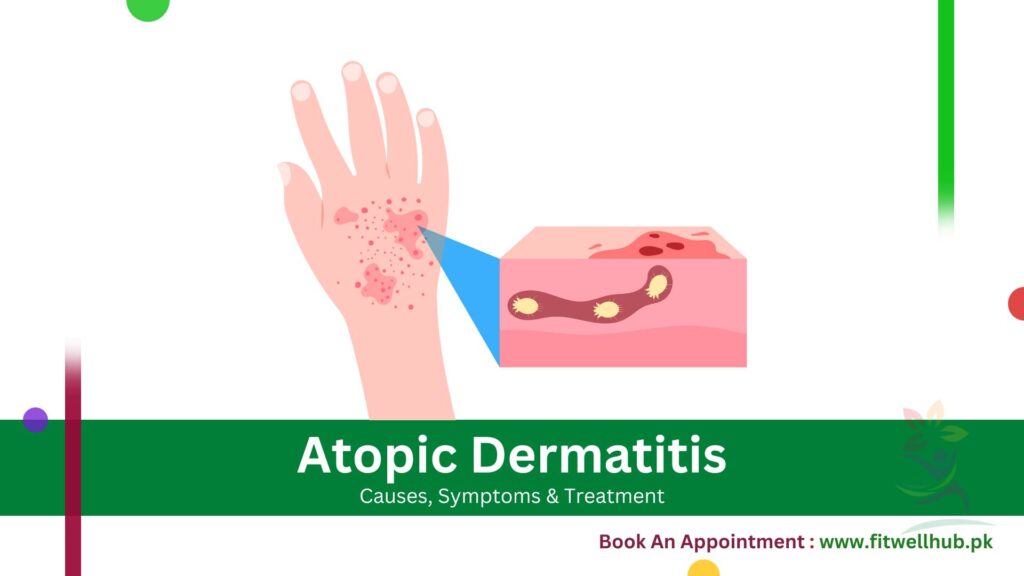Atopic dermatitis, also known as eczema, is a chronic skin condition characterized by red, inflamed patches of itchy skin. Eczema usually starts in early childhood, though sometimes persisting into adult years, affecting both children and adults. The causes of Atopic Dermatitis (eczema) are unknown, but it is generally believed to be a multifactorial outcome of both genetic and environmental factors. The eczema cannot be cured but can be controlled by effective management of triggers, constant moisturization, and using medications prescribed by doctors.
Quick Links
ToggleAtopic dermatitis (eczema) in Pakistan has an incidence rate of 21.4%, with a higher prevalence in Punjab and Khyber Pakhtunkhwa. It predominantly affects infants and toddlers, contributing significantly to dermatological cases, especially in urban and low-income areas where environmental factors aggravate the condition. At FitwellHub, we use healthcare technology to provide advanced diagnostics and personalized treatment plans for eczema. Our smart clinics ensure comprehensive care, addressing environmental triggers and delivering solutions for patients across Pakistan.
Symptoms
Some of the common symptoms of atopic dermatitis include:
- Itching: The primary sign of eczema is intense itching, which often gets worse at night. Severe skin damage and irritation occur from scratching.
- Dry, Scaly Patches: The area of the skin may become dry and scaly, forming patches that may crack or peel off due to their rough and flaky nature.
- Red or Inflamed Skin: Eczema generally affects the hands, face, neck, inside of the elbows, and knees. It causes red, irritated patches of skin.
- Blisters or Crusting: Eczema, in severe cases, results in tiny blisters filled with fluid that may burst, causing crusting and possibly infections.
- Thickened Skin: Chronic irritation can cause frequently scratched regions of skin to thicken and become leathery over time.
GET IN TOUCH
Book An Appointment
When to See a Doctor
It’s important to visit a doctor if you or your kid has chronic redness, itching, or discomfort that impairs day-to-day functioning. Early intervention reduces the chance of complications like infections and stops the disease from getting worse. Understanding the causes of atopic dermatitis and getting medical advice from a dermatologist is recommended for severe flare-ups or symptoms that are unresponsive to over-the-counter remedies.
Our dermatologists at FitwellHub are experts in treating eczema and other skin conditions. Book an appointment with us today, and let our experts guide you on your wellness journey!
Causes Of Atopic Dermatitis
Some causes of atopic dermatitis are:
- Genetic Factors: Eczema appears to be an inherited condition. Individuals with parents having eczema, asthma, or hay fever are more susceptible to this condition.
- Immune System Overreaction: Overreaction of the immune system to irritants or allergens causes inflammation, which is a trigger of eczema symptoms, for example, itchy and red skin.
- Skin Barrier Dysfunction: Eczema patients have weak skin barriers, so moisture escapes, and irritants or allergens penetrate the body easily.
- Environmental Triggers: Cold weather, dry air, or exposure to harsh soaps and detergents can worsen eczema symptoms or trigger flare-ups.
- Allergens: Common allergens in patients with eczema are pollen, pet dander, dust mites, and some food items that provoke an immune response and thus aggravate eczema.
Risk Factors
Primary risk factors for developing atopic dermatitis include:
- Asthma or Allergies: Asthma and hay fever are allergic conditions that are related to eczema. Patients with asthma and allergic conditions face more severe eczema attacks.
- Age: Eczema typically develops at an early age, but this also happens in adults, particularly those who had eczema when they were younger.
- Living in Urban Areas: Living in a town or an industrial area, with increased levels of pollutants or allergens, tends to increase the risk of having an eczema flare-up.
- Climate: Eczema flares worsen in cold and dry environments and extreme humidity because it dries out the skin or increases extreme irritation.
Complications
If not treated, atopic dermatitis can lead to several complications, among which are:
- Skin Infections: The irritation and constant itching of the affected area break the skin, thus creating pathways for bacteria or viruses that may develop infections such as impetigo or herpes simplex.
- Chronic Itching: Continuous scratching will lead to chronic itchiness and irritation, thus deteriorating the skin condition and creating a cycle of irritation.
- Sleep Disruption: Severe itching, mainly during the night, can interfere with sleep, leading to fatigue, irritability, and a poor quality of life.
- Eye Problems: Eczema may cause eye problems, such as conjunctivitis or irritation around the eyelids, leading to discomfort or vision problems.
- Scarring: Redness and irritation with repeated rubbing and skin damage can lead to inflammation that can cause thickened, scarred skin, mainly in areas that experience repeated flare-ups.
Prevention
Prevention of flares requires avoiding triggers and keeping the skin healthy:
1- Moisturize Daily
Keeping the skin hydrated prevents flare-ups. Use fragrance-free, hypoallergenic creams or ointments to lock in moisture and maintain the skin’s protective barrier.
2- Avoid Triggers
Identifying and avoiding potential triggers, including allergens, irritating soaps, or hot and cold temperatures, can also decrease the frequency and severity of eczema symptoms.
3- Use Mild Skincare Products
Use gentle, fragrance-free cosmetics and skin care products that do not irritate the skin. Avoid hot water and scrubbing that will also make the skin dry.
4- Wear Breathable Fabrics
Wearing soft, breathable clothing like cotton helps in reducing irritation, which can be one of the causes of atopic dermatitis. Avoid the use of wool or synthetic clothing that causes itching and discomfort.
5- Manage Stress
Stress is also a trigger for eczema. Stress management through deep breathing, yoga, or even meditation can help in preventing stress and subsequently reduce symptoms of eczema.
FitwellHub offers customized skin care plans in addition to having stress management programs designed to help the individual avoid eczema flare-ups. Visit our help page for more information.
Diagnosis
The following tests are used for the diagnosis of atopic dermatitis:
- Skin Examination: A dermatologist evaluates the affected areas of the skin to check the spread and severity of the eczema.
- Patch Testing: Patch tests are used to find out the environmental or chemical factors that trigger flares of eczema to guide treatments.
- Blood Tests: Blood tests are used to measure the levels of immunoglobulin E (IgE), which are normally elevated in eczema patients and allergies.
- Allergy Testing: It involves skin prick test methodologies to determine the allergens causing eczema.
- Biopsy (in rare cases): Biopsy is done in some rare cases to find other diseases and confirm the case of eczema.
At FitwellHub, we offer diagnostic services that help diagnose and manage atopic dermatitis. Visit our lab for more information.
Treatment
The following treatment options are used for the better management of atopic dermatitis:
1- Topical Corticosteroids
Topical corticosteroids are used as the primary treatment in reducing inflammation and providing relief from itch during flare-ups of eczema. These creams are applied directly to the affected skin.
2- Topical Calcineurin Inhibitors
For individuals who cannot use corticosteroids, a topical calcineurin inhibitor may be used to inhibit the immune response and decrease inflammation.
3- Oral Medications
Antihistamines or oral steroids are prescribed in severe cases for controlling intense itch and inflammation.
4- Light Therapy
In phototherapy or light therapy, controlled amounts of ultraviolet light are applied to the skin to decrease inflammation and improve skin symptoms.
5- Moisturizers
The constant use of moisturizers will help repair the skin barrier and prevent flare-ups. Thicker creams and ointments are recommended for those who have dry and sensitive skin.
Medications
The following are the common medications prescribed for treating atopic dermatitis:
- Topical Corticosteroids: Topical corticosteroid creams are applied directly on the affected skin to reduce inflammation and itching during a flare-up.
- Oral Antihistamines: These are taken orally to reduce the itching, mainly at night, making sleeping easier and avoiding further irritation of the skin.
- Topical Calcineurin Inhibitors: Topical calcineurin inhibitors are alternative drugs to steroids, usually used for high-sensitivity areas like the face.
- Immunosuppressants: These drugs suppress the action of the immune system. In severe diseases, immunosuppressive drugs are used to temper the immune response and, consequently, flare-ups.
- Antibiotics (for secondary infections): Antibiotics may be used to treat bacterial infections and prevent complications if the skin becomes infected due to scratching.
At FitwellHub, our pharmacy offers a wide range of medications for treating atopic dermatitis and related symptoms. Visit our pharmacy to explore available options and consult with our experts.
Conclusion
Atopic dermatitis (eczema) is a chronic skin condition characterized by red, itchy patches. While it is not curable, it can be effectively managed with proper treatment and lifestyle adjustments. Understanding the symptoms of atopic dermatitis, such as intense itching, dry patches, and inflamed skin, is key to early intervention. The causes of atopic dermatitis include genetic factors, immune system overreaction, and environmental triggers. By identifying and avoiding these triggers, moisturizing regularly, and following a treatment plan, flare-ups can be controlled, improving the quality of life for those affected.
GET IN TOUCH
Book An Appointment
Frequently Asked Questions (FAQ’s)
Atopic dermatitis, also known as eczema, is a chronic skin condition characterized by red, inflamed patches of itchy skin. Eczema usually starts in early childhood, though sometimes persisting into adult years, affecting both children and adults.
Atopic Dermatitis (Eczema) can be caused by various triggers, like allergens, stress, extreme temperatures, and even some harsh skincare products, wool, and other fabrics.
No, there is no cure for eczema, but it can be effectively controlled with proper skincare, medications, and avoiding triggers.
Prevention of flare-ups involves moisturizing, avoiding triggers, using gentle skincare products, and stress management.
No, eczema is not contagious. It cannot be spread from one person to another through skin contact.














